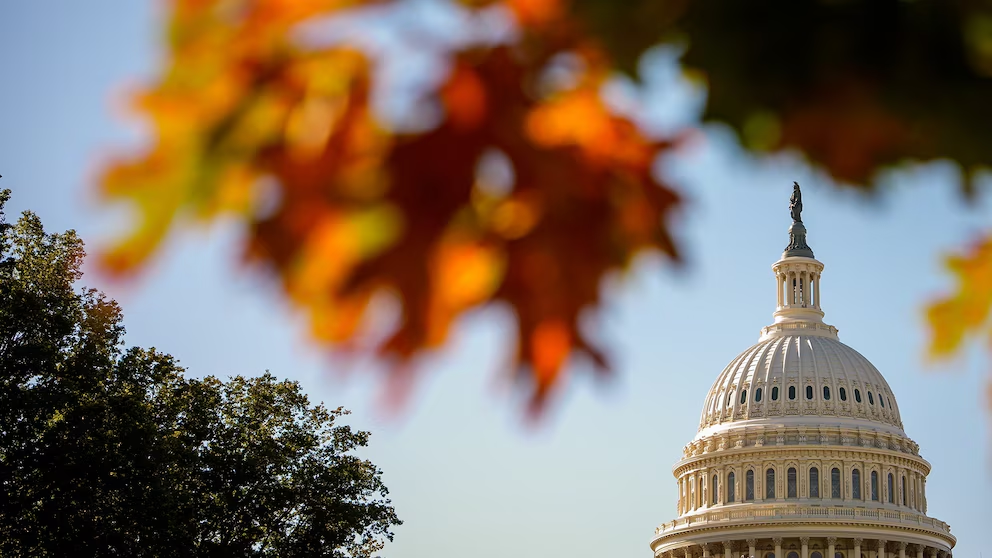“1:34 The dome of the US Capitol can be seen on October 22, 2025 in Washington, DC. Andrew Harnick/Getty Images The U.S. economy has been largely unaffected by the government shutdown, but the nation could risk economic danger if the stalemate deepens into a long-term standoff, some economists told ABC News. The approximately 750,000 furloughed state employees are already feeling the pinch […]”, — write: businessua.com.ua

1:34 The dome of the US Capitol can be seen on October 22, 2025 in Washington, DC. Andrew Harnick/Getty Images
The U.S. economy has been largely unaffected by the government shutdown, but the nation could risk economic danger if the stalemate deepens into a long-term standoff, some economists told ABC News.
An estimated 750,000 furloughed civil servants are already feeling the pinch from the shutdown as they suffer from non-payment of salaries and tight budget. These direct effects will increase dramatically on November 1, when millions of low-income Americans will lose access to critical food assistance.
A long layoff of several months or longer can leave laid-off workers exhausted. savings, while undermining broader spending power as a Economists say many people are being left without key government support. The lack of gold-standard economic data typically released by the federal government could also contribute to uncertainty, reducing confidence among businesses and policymakers, they added.
The threat of increased risk comes as hiring slows. fears of recession and inflation are difficult to fully contain.
“We’re gradually reaching a point where the shutdown is becoming more significant,” Gregory Dako, chief economist at accounting firm EY, told ABC News, warning of a “vicious cycle” in which prolonged shutdowns cloud the economic outlook and dampen economic activity.
“A government shutdown would be an additional headwind that could further weaken the foundation of the U.S. economy,” Dako added.
But at least one economist downplayed the economic threat posed by a government shutdown, even if it stretched into months.
“Cutting down jobs requires remarkably little money because most federal spending is on autopilot,” Jeffrey Campbell, an economics professor at the University of Notre Dame and former senior economist at the Federal Reserve Bank of Chicago, told ABC News.
A longer shutdown could add another record to the nation’s woes, but it would likely have “side effects,” Campbell added, adding that the effects would be limited to a relatively narrow segment of the economy.

Guests shop during Nordstrom’s flagship event on October 21, 2025 in New York City. Craig Barritt/Getty Images
Each week of a potential government shutdown would reduce annual real gross domestic product (GDP) growth in the quarter by about 0.1%, or about $30, Mark Zandi, chief economist at Moody’s Analytics, said in a statement to ABC News.
For reference, the economy grew an average of 1.6% in the first half of 2025, meaning it would take a long enough shutdown to do significant damage.
If the shutdown lasts until the end of 2025, it could cut annual GDP by as much as 2% in the current quarter, potentially leading to an economic downturn over the three-month period, Dako said.
Sentiment among investors and consumers Some economists warn could worsen as uncertainty hangs over the economy, warning of a feedback loop as participants brace for further pain and the next pullback causes sluggish economic performance.
“If this extends to the holiday shopping season between Thanksgiving and Christmas, a recession will become a real threat as it will weigh on already fragile consumer, business and investor confidence,” Zandi said.
Still, some economists expressed skepticism that a government shutdown could undermine the U.S. economy, which has proven resilient in the face of high inflation, sweeping tariffs and burdensome interest rates.
Although hiring has slowed, the country’s unemployment rate is still at historically low levels. Inflation has picked up in recent months, but remains well below pandemic-era peaks.
“When you’re in a pretty good place, you get pushed a little bit away from it, it’s not so bad,” Campbell said. “If we were in a bad situation and made it worse, then it would have cost a lot more.”
A pause in government economic data during the shutdown made it difficult to assess the health of the U.S. economy, but economists
The US Bureau of Labor Statistics is set to release inflation data on Friday, but the figures will be more than a week late. Earlier this month, the agency delayed the release of the closely watched jobs report without scheduling an alternate release date.
Policymakers and business leaders can still use private-sector data sources, but the loss of some federal data will make it harder for them to act with the kind of confidence that will support the economy, Dako said.
“The lack of data adds uncertainty to an already uncertain underlying economy,” Daco said.
Source: abcnews.go.com
Please wait…
